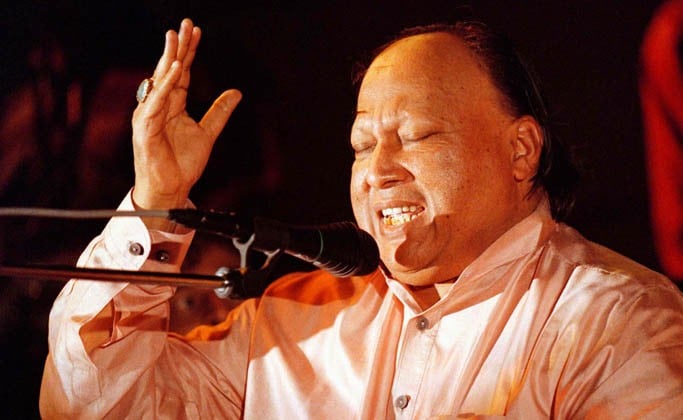
Nusrat Fateh Ali Khan, like other Pakistani artistes rising to stardom, received death threats but did not back away from what he was singing

We remember Nusrat Fateh Ali Khan 19 years after his death not only as a vocalist and composer but also as a courageous individual.
The insecurity that the artistes in our country or society face was dramatised by the death of Amjad Sabri, and still like in most other cases, the killers have not been arrested or even identified let alone proceeded against. Even in the case of Amjad Sabri other causes are attributed to his murder. Some have come forward with reasons such as Sabri’s political sympathies and others with matters of money, and very few say that he was murdered for his music.
Some decades ago, we thought that musicians and vocalists were not someone to fear. The poets were feared and so were the writers for either writing something that was against the political interests of the sections or for challenging the given perception of truth through their writings. Likewise, the painters too were reviled mostly because some of their world was considered to be violating the perceived moral code upheld by some sections of society. But the musicians were not discriminated against except within the larger framework of what was permissible under religion.
Nusrat Fateh Ali Khan was a brave man for he received threats throughout his life. These became more directed and vicious in the last decade of his life as he became more known and caught media headlines. He came into the limelight first on the national level and then was recognised internationally - accepted by cultures that were very diverse from ours. But, he was a courageous man and did not back away from what he was singing. He had firm faith in the truth of what he was practising and considered any harm being inflicted on him as the challenge that came from being in the line of duty.
Most of our musicians, vocalists and instrumentalists have a rock-solid belief in whatever their complexion of faith, and all music for them in an exercise towards the fulfillment of that end. Most have a pir, are beholden to a certain personage, or a silsila; and no matter what, it is very difficult to make them change the orientation of their belief. Since most have lived under conditions which have been hostile and antagonistic, they develop or have developed an attitude that is low-keyed, non-provocative and undemonstrative. Most of them are peace-loving individuals and do not engage in brawls, fights and bickering unless it is about the quality of music.
Abida Parveen too, has received threats on account of what she sings; and this, has been going on for a very long time. But she attained a certain standard and also had many options to perform abroad which made it possible for her to be away from the country for long stretches of time. Even now, she performs more in places outside the country than inside, and that gives her a certain respite from the pressures that such situations exert. Many of our artistes that performed in India became the objects of severe criticism and certain lobbies within the country wanted action to be taken against them so that they would be barred from going there.
It is a bit strange because artistes -- when invited to perform outside the country -- actually enhance the reputation of the country. If a Pakistani artiste is invited to India, it should be a matter of great pride for us; instead, there is a demand to ban such artistes. Some remark is taken out of context to paint the artiste as one working against the national interests of the country. It is all very ironic because the real understanding of our music rests with the people of the subcontinent. Since they both share the same music system, the true appreciation of the finer points too lies here.
Women are more vulnerable, and if attacked, they find even lesser number of sympathisers. It is seldom that one hears of a woman artiste killed or attacked and the general public saying that it happened because of her music or art. Usually, some other reason is attributed for the act of violence as is the case with women generally. The common perceptions revolve round their morality and even very enlightened individuals in society are unable to overcome their ingrained prejudices and blame the woman for some act of grave impropriety.
As these women are public figures, people consider it their birthright to know everything about them and then to mould the women’s lives according to heart’s desire. Men also face similar conditions but the severity of it all is nowhere as fiercely nasty.
Most of the musicians/ vocalists have faced grave social discrimination and they have lived under the shadow of prejudice but it has been rare that they faced threats to their lives. This is something that one has seen and experienced in our growing intolerant society. Nusrat Fateh Ali, a very good vocalist, was only recognised -- and that too grudgingly -- when he was lauded as a superstar by the West. Once he was awarded the stamp of authority, the locals followed him and wanted more to be seen with him so they could tell that Nusrat Fateh Ali had sung in their house or at their sister’s wedding ceremony and had very little to do with the contents of his music. Because of the beat of the qawwali, what he relished in was dancing to its rhythmic division.
Nusrat Fateh Ali was the face that was known throughout the world and many people heard the name of the country for the first time when they were told that he belonged to Pakistan.
(Nusrat Fateh Ali passed away on August16, 1997)